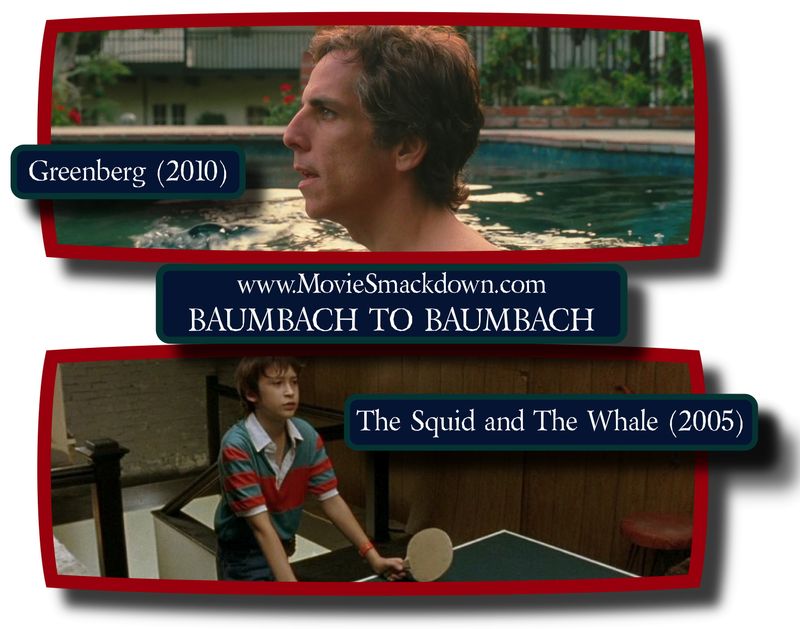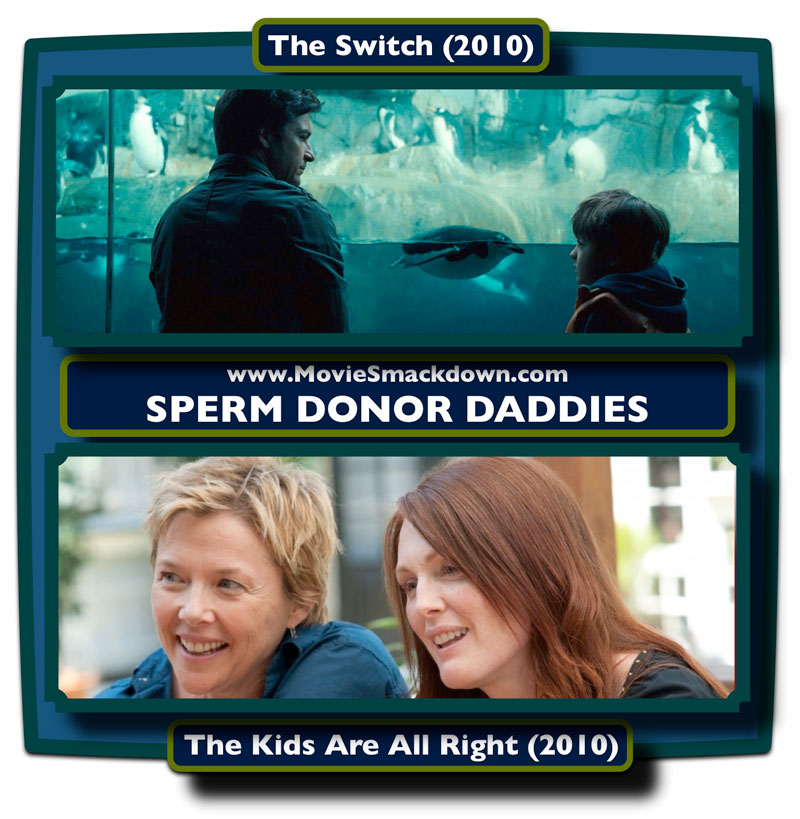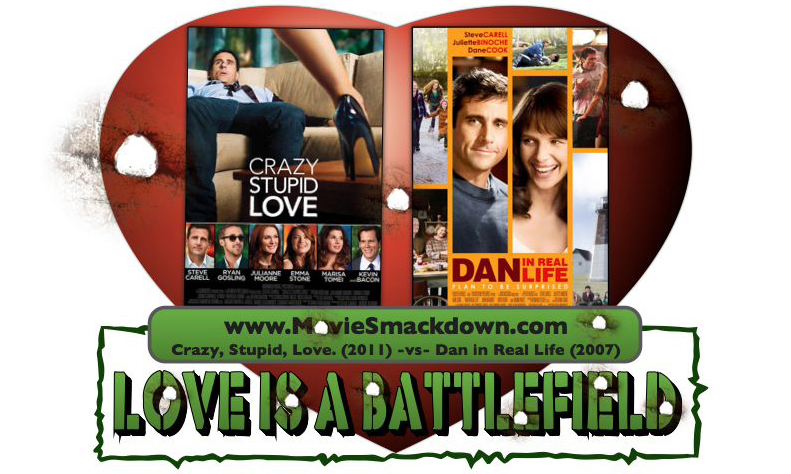
 The Smackdown
The Smackdown
Indie darling Noah Baumbach presents two convincingly dysfunctional little worlds you might want to visit but probably wouldn’t want to inhabit. The tendency is to assume some autobiographical bent, but that approach won’t lead you anywhere you need to go. It’s probably best when dropping in on his thoroughly modern losers and posers and all their hapless victims and co-conspirators to look inward and see where that gets you. You might see yourself and your own foibles a little more clearly than you wish. Which cinema mirror gets you to uncomfortable insights and clarity faster? Mid-eighties flashback or of-the-moment snapshot? It’s a close call, uncomfortably close for some.
[singlepic id=320 w=320 h=240 float=right]
The Challenger
Ben Stiller plays the title character in Greenberg. Shortly after a vaguely referenced breakdown, Greenberg leaves his New York home to house-sit in Los Angeles for his impossibly successful, recognizably obnoxious brother. There he meets his brother’s assistant, the much younger and ditsier Florence, and Greenberg falls half in love with her. He also half-tries to make amends with some old friends he’s lost along the way, friends who’ve made the cardinal mistake (in Greenbergworld) of growing up. Commitment presents the biggest danger in this lethal love letter to arrested development in all its new millennial guises.
[singlepic id=306 w=320 h=240 float=right]
The Defending Champion
In The Squid and the Whale, it’s 1986 in Brooklyn, and a dysfunctional family is splitting up. Bernard (Jeff Daniels) is the stingy, selfish professor patriarch of the clan, and Joan (Laura Linney) its cucumber-cool matriarch and blossoming writer/adulteress. Their two sons, high schooler Walt (Jesse Eisenberg) and middle schooler Frank (Owen Kline – real life son of Kevin Kline and Phoebe
Cates) bear the brunt of the break. The title derives from a terrifying exhibit in Manhattan’s American Museum of Natural History; a life-sized giant squid and monstrous whale locked in eternal combat, suspended in watery blue light from the ceiling, have provided nightmare food to generations of New York City’s children and now making a rather lovely and poetic metaphor. I remember shielding
my own eyes from wholly taking in the horrific scene overhead, and I remember my daughters doing the same, peeking out through the cracks between their fingers to better manage their fear. Children want to shield their eyes from seeing their parents battling and inflicting pain in the throes of a bad
marriage or divorce. Taking it all in at once might prove too much for the tender hearted young things, but eventually, one needs to see things as they truly are.
The Scorecard
In the Squid and the Whale, the usually luminous Laura Linney turns off her heart-light (to misquote a corny Neil Diamond lyric – one I didn’t write but could have) to play the chilly villainess, the mother with the heart of stone, thoughtlessly mistaking candor and over-sharing for loving communication. Jeff Daniels adds another portrayal to his cottage industry of playing academic assholes – the pompous English professor who sucks at life, his every literary opinion and cultural pronouncement delivered with the unearned gravitas of a papal pronouncement. In the guise of intellectual honesty and depth, he’s training his sons for a life filled with judgment and dissatisfaction, always hunting for the invisible and constantly moving line between purist and philistine. Even the smallest violation of his constant spew of cultural code and criticism earns ouster from his church of one. Minor Dickens, minor Fitzgerald, worthless popular culture unless he’s indulging in a little Elmore Leonard (the fillet of the genre), the Knicks…this guy’s a piece of work, and everyone and everything falls a little short.
The mother “dates” the tennis pro (William Baldwin), the father makes a creeper move on one of his students (Anna Paquin). All this sexual openness makes for a lot of emotional shrapnel. Children caught
in the careless crossfire shoot right back, retaliating without much aim, cruelly causing collateral damage in their wake.
But lest we despair too much, we know (or at least we think we know) that at least one of these “fictional” brothers survived and thrived, prospered even, turned these dysfunctional lemons into
indie darling lemonade. If we take the piece as slightly reworked autobiography, we can imagine a slightly older Frank or Walt earning a comfortable living picking the bones of a less than ideal childhood. Perhaps this kind of messy childhood breeds success; happy families breed happy families, not artists. Or at least that’s what we artists tell ourselves when the darkness crowds us.
“Hurt people hurt people,” says Florence, quoting her therapist. Well, yeah.
In Baumbach’s modern day Los Angeles, the disconnect continues and the rift grows wider between people. Love seems somehow outside the realm of possibility. Shambling through the wreckage of these wasted emotional lives, all these lonely people don’t even remember intimacy, don’t
even attempt it. Everything is casual here; cruelty and thoughtlessness, abandonment, miscommunication, and missed messages the currency of exchange. These characters are unsentimental, unceasingly critical, derisive, detached, and dead-set on avoiding attachment; sex is so casual and un-fulfilling that it loses all meaning and pleasure. These zombie people slide in and out of beds, marriages, town, abortions, without registering anything much but a dull ache where real pain
ought to be. Always on the lookout for something better, these narcissists seek pleasure and find only numbing activity; they fill their days somehow, connecting fully only with their dogs. Never far from an answering machine or a computer screen or a cellphone, these lost souls are drowning in their loneliness.
Greta Gerwig plays Flora, the emotional center of Greenberg, the sweet creamy nougat with a little chopped nut. Her performance is daringly un-actressy, listless and aimless and utterly lost in a way seldom captured on film. Somehow, you want Greenberg to love her while you think she might do better. She sings in a nightclub, evoking Annie Hall echoes, but you’re not sure what you’re supposed to feel. She seems somehow exposed and naked and vulnerable, even when she’s dressed. Her heart works just fine; it’s the rest of her life that’s got her (and us) unhinged. Stiller goes deep, eschewing his usual surface Jewish movie neurosis for the real deal. Baumbach’s actors have to risk playing unlikable, and it’s a bold choice. It’s hard to find anyone to really like in these films. The “good” characters
disappear for long stretches and are nowhere near the center of the action. You’re forced to look closely at people you don’t like and to wonder why they bother you so much. It’s impossible not to see moments of recognizable human behavior – something altogether rare. You’ll be reminded of people you know, and ultimately, you’ll be forced to see yourself. It’s a scary little ride. Consider yourself warned.
The World of Baumbach seems deceptively mundane; not much happens, and the comedy is occasionally light, but it packs a huge wallop. A few bright spots shine like human lighthouses, beacons of sanity. Ivan (Rhys Ifans) in Greenberg and Sophie Greenberg (!) (Halley Feiffer –
cartoonist/writer Jules’ daughter) in The Squid and the Whale both have their heads on straight and their hearts on target. Both seem fully capable of love and attachment and offer rays of hope for the protagonists and for us.
Watching a family dissolve is ugly stuff. Frank and Walt suffer; they’re not offered much in the way of a respite, and neither are we. Unforgiving as a fluorescent bulb trained on an interrogation, this portrait of
a family in crisis is unflinching, warts and all stuff. It’s not for everyone. I remember the first time I saw the film feeling terribly uncomfortable about some of the things Owen Kline was asked to do. It was a startling and disturbing (brave and brilliant) performance, and I found consolation in the
thought that he comes from a family of actors who no doubt counseled him appropriately. I’m delighted to report that he hasn’t worked professionally since.
The Decision
I can’t recommend either film to a wide audience; by their very nature, they’re hardly people pleasers. They’re both worth seeing, and they’ll both leave you with plenty of food for thought. Choosing a winner is difficult. The Squid And The Whale has resonated longer for me, since I’ve had it on my mind for five years, and exploding families harbor more power for me than do arrested adults. That said,
I’m sure that five years from now, I’ll be recommending Greenberg with equal parts enthusiasm and reservation.




Great. I wonder now if I’m in the “mindless” category….
Thank you. I’m extremely touched by that comment.
you are the smartest human being i know. i read your reviews for the same reason you like these movies. you have a human insight that goes deeper than “mindless – did I like it?” or “technical- how did they make that? ” kind of stuff. Thanks!
Brian, Brian, Brian. I hope you’re trying to be funny. But I’ll use the opportunity to educate and enlighten. Here’s a very short tip-of-the-Icebergs/Goldbergs (illustrative) list of famous British Jews I’m pretty sure you’ve heard of: Linda McCartney, Antony Armstrong-Jones, Lucian Freud, Stella McCartney, Vidal Sassoon, Stephen Fry, Sasha Baron Cohen, Nigella Lawson, Lew Grade, Benjamin Disraeli, Marty Feldman, Laurence Harvey, Leslie Howard, Miriam Margolyes, Elizabeth Taylor, Sam Wanamaker, Rachel Weisz, Zoe Wanamaker, David Warner, Claire Bloom, Helena Bonham Carter, Eleanor Bron, Joan Collins, Jackie Collins, Anthony Newley, Ron Moody, Stephen Frears, Lord Grade, Richard Lester, Karel Reisz, Michael Winner, Sir Alexander Korda, John Schlesinger, Matt Lucas, Peter Sellers, Peter Brook, Nicholas Hytner, Jonathan Miller, Anthony Sher, Manfred Mann, Gavin Rossdale, Joss Stone, Amy Winehouse, Brian Epstein, Lionel Bart…I could go on. And on. Jews are the virtual trading cards I keep collected in my brain, especially show business ones.
England has Jews?
I think your comparison would be more apt were director Mike Leigh not Jewish. How about an American Mike Leigh? It’s the honesty and humanity of both men that some mainstream viewers find overly tough and challenging, I think. More palatable, popular, candy-assed, santized, and simplified versions of human behavior crowd every screen. I appreciate their efforts to go deep.
I just came back from viewing Greenberg. You made me do it. In the crest of the plot (the party) the whole room began to sway from the 7.2 Mexicali earthquake. The quake went on for quite a while. I wanted to leave the theater but I couldn’t bring myself to do so. I actually wanted to leave before the earthquake, but I couldn’t bring myself to do so. I found both movies to be deeply disturbing but not in a gratuitous way. Food for thought. This director might be a depressed, Jewish Mike Leigh.
If your goal in reviewing is to make people want to see a movie, then you have reached it. That said, I find what you wrote scary and unnerving. I look forward to both films with the same feeling I have when I find out that the new flu vaccine is in.